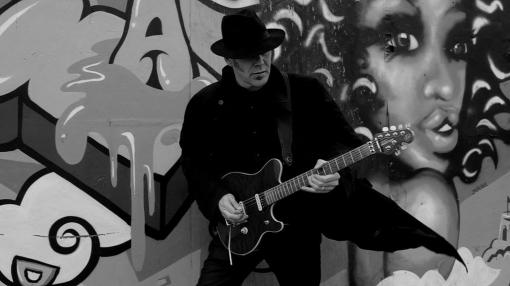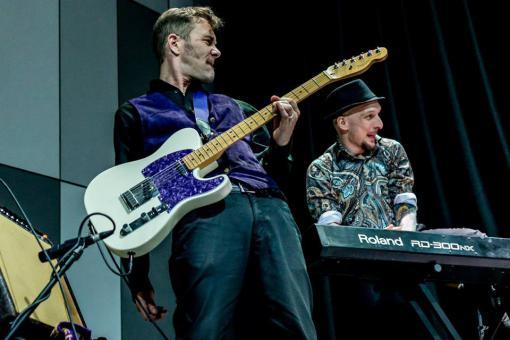A long Czech tour of the English blues guitarist Will Johns was taking place nearly all throughout September. A nephew of Eric Clapton and George Harrison and a son of famed producer Andy Johns (he worked with Led Zeppelin and the Rolling Stones) began touring in the early 1990s. His latest album is called Something Old, Something New... and Will Johns will also present it in Brno. His concert in the Stará Pekárna Music Club will take place on Tuesday, 13 September from 8:00 p.m. This interview with the guitarist was conducted by phone.
Your new album is called Something Old, Something New... What is old and what is new on it?
Wait a second, I have to look...I wanted the album to include something I played with my first band in the 1990s, perhaps in 1992, and such an old song is, for example, the Righteous Road. That was one of the first songs I wrote. I wrote it together with my friend Dave Motion. Therefore, it is an "old song" for me and for my career. On the contrary, the very latest song is Into Your Love. It was created very quickly at the last minute when I was preparing the album. The Mousetails is also new. I wrote these two when the album was almost finished. In both cases, it was the end of 2015.
Does the album have a concept or did you just mix older and newer songs?
The concept of the album was – "something old, something new, something borrowed, something blue". It is our wedding saying that is associated with magic and protection against evil, against the evil eye. According to the tradition, such protection should be the "blue eye", a symbol which can be found on the cover of my album. Even my album should therefore be such a talisman that protects you from the eyes of evil people. And the content of the album is related to the saying. Something borrowed – that is the song I Heard You Love The Blues composed by a blind African American guitarist Jay Owens. He died relatively recently but few people know his music. It is therefore a borrowed song. The word blue means blue, but also sad or blues in English... My blues is current, dancing; these are not songs about crying and despair, loneliness, and about how someone was left by their woman. With my music, I try to celebrate the roots of this genre. I like it this way, and if you also like it, you can listen to me in your city. I will play just for you.
 In Brno and other concert during the Czech tour, accompanying you will be Tomáš Liška on bass and Tomáš Hobzek on drums. But you recorded the album with British colleagues...
In Brno and other concert during the Czech tour, accompanying you will be Tomáš Liška on bass and Tomáš Hobzek on drums. But you recorded the album with British colleagues...
Yes, the first one I will mention is my backing vocalist Emma Wilson. She is a great singer, as you can hear from the recording, and it is wonderful to work with her. She has her own band here in England, called Emma Wilson Blues Band. Nick Judd plays the piano and keyboard. He also has his own band and, moreover, he plays with many other people, such as the famous guitarist Chris Spedding. Chez Grimble plays the saxophone. She is a fantastic lady who appeared on YouTube as a guest on my successful video clip Smuggler's Blues from 2012, I think. Russell Grooms plays the bass on my album. Finally, drummer Chad Logan – that is my work. He is a fictitious character I created. I play the drums myself. But it's a secret...
Did your fellow musicians help arrange the album?
No, I worked on this CD alone. It was the loneliest album I have ever recorded. I recorded most of it at home on the computer. In some cases, I heard the arrangements of the songs quite clearly in my head when I wrote the songs. It was a matter of course. However, for example, in the songs Mousetails, which has a very contemporary sound, or Tears Of A Butterfly arrangements are the result of a longer process in the studio. We tried multiple versions, we were trying to figure out how to conceive the songs. The vocal band OYME from the Mordovia region in Russia also contributed to the song Tears Of A Butterfly.
You have toured Russia, and you even had a concert in the former women's prison in the gulag. I suppose it must have been an intense experience...
Yes, exactly, it was one of the most powerful experiences of my life. I felt an enormous humility when I played in the space of the former women's prison in the gulag. It was a place imbued with emotion and it was difficult to play there. When we came out, we felt a great relief. But right after that, we crashed in a snowstorm and I was really scared.
Did the audience in Russia understand your music?
Every time I have a concert, even in England, I try to also play some traditional blues that people know. The pleasant thing about this music is that it really appeals to everyone with its simple rhythm that resembles the pulse of our heart. And thanks to this rhythm, everyone can understand it. Whether the audience is young or older, everyone can respond to music. I try to play the songs in a bit more modern way, I pack them into a little funky, but it is still music that is familiar to everyone.
How important are lyrics to you?
Lyrics are very important to me but at the same time they are not really important. I realised this in Mordovia where people did not understand English at all – that was the difference, for example, compared with Moscow – and they were still able to understand the energy that comes from my music. So, you are listening to my music and understand what I wanted to say, even though you may not understand the words. On the other hand, my lyrics are full of humour and something I would call "the language of the blues". Familiar themes or phrases such as the theme of a journey appear in them. However, it applies that I say something but I am referring to something else.
Did your uncle Eric Clapton help you on your journey to music?
He showed me a few things on the guitar. For example, he showed me the beginning of the song Crossroads, but I could not learn it. When I came to him to tell me how to proceed, he told me: "You have to figure out for yourself". To me, that was an important lesson. But when I was little and started to learn to play the guitar, he supported me a lot, for example, when I played at school concerts. He gave my school a proper amplifier. But he did not teach me. He showed me a few things, but otherwise he mainly encouraged me to teach myself. I think that it is the best way. So I was using recordings to learn the songs that I liked.
You father, producer Andy Johns, was also professionally engaged in the music field. What did he teach you?
My father and I spent many hours in the evenings when he played music for me, on which he was working, or songs that he thought were well produced. He worked in an interesting way and managed to describe his work to me. And it is amazing what all he managed to do. But he also drank a lot, so I had to pay attention at the beginning to learn something. However, I feel to be mainly a musician, secondly an author and only then a producer. For example, I was not in charge of mixing my new album. Instead, it was Paul Winstanley, nicknamed Win. I had previously worked with him on my previous CD Hooks And Lines, I trust him one hundred percent. We can communicate honestly, quickly and efficiently in order to get the best result.































